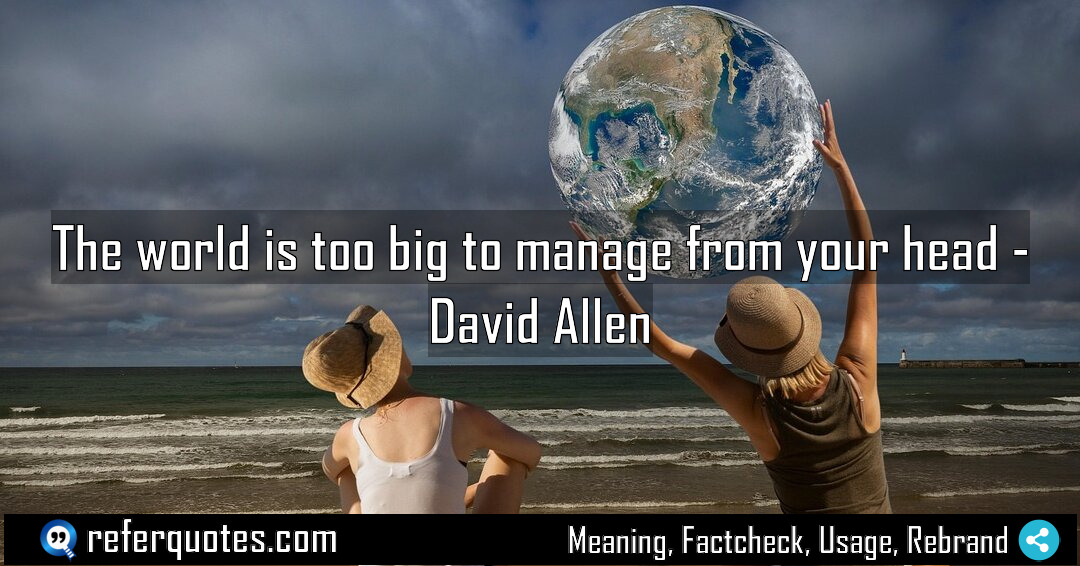You know, “The world is too big to manage from your head” is one of those lines that completely reframes how you think about productivity. It’s not about working harder; it’s about working smarter by getting things out of your skull and into a system you trust. This simple shift is the key to unlocking a calmer, more focused mind.
Share Image Quote:Table of Contents
Meaning
The core message is brutally simple: your brain is a terrible office. It’s a brilliant creator, but a lousy filing cabinet. Trying to keep every commitment, idea, and to-do swirling around in your mind is a recipe for stress and missed details.
Explanation
Let me break it down for you. Your conscious mind, what we call “working memory,” has severe limits. It can only hold a handful of things at once. So when you try to “manage the world” from there—remembering that report due Friday, your mom’s birthday, that weird noise the car is making, and what to get at the grocery store—it creates immense cognitive load. It’s like having 50 browser tabs open at the same time. Your system slows to a crawl, you feel overwhelmed, and you’re prone to crashing. What David Allen teaches is to use your head for having ideas, not for holding them. You externalize everything into a trusted system. That system—whether it’s a fancy app or a simple notepad—becomes your “second brain.” And the moment you do that, your actual brain is freed up to focus, to be present, and to do its best creative work. It’s the difference between being a frazzled, anxious manager and a calm, strategic CEO of your own life.
Quote Summary
| Context | Attributes |
|---|---|
| Original Language | English (3668) |
| Category | Personal Development (697) |
| Topics | clarity (95), organization (18), thinking (18) |
| Literary Style | aphoristic (181), simple (291) |
| Emotion / Mood | realistic (354) |
| Overall Quote Score | 69 (33) |
Origin & Factcheck
This wisdom comes straight from David Allen’s seminal book, Getting Things Done: The Art of Stress-Free Productivity, which was first published in the United States back in 2001. It’s the cornerstone of the entire GTD methodology. You won’t find it falsely attributed to anyone else; it’s pure, unfiltered Allen.
Attribution Summary
| Context | Attributes |
|---|---|
| Author | David Allen (50) |
| Source Type | Book (4032) |
| Source/Book Name | Getting Things Done: The Art of Stress-Free Productivity (50) |
| Origin Timeperiod | 21st Century (1892) |
| Original Language | English (3668) |
| Authenticity | Verified (4032) |
Author Bio
David Allen created the GTD methodology and helped millions organize work and life with clear, actionable steps. He began as a management consultant, refined GTD through client engagements, and published Getting Things Done in 2001, followed by Ready for Anything and Making It All Work. He founded the David Allen Company and expanded GTD training globally, later relocating to Amsterdam to support international growth. A sought-after speaker and advisor, he remains a leading voice on clarity, focus, and execution. Explore the David Allen book list for essential reads.
| Official Website | Facebook | X| Instagram | YouTube
Where is this quotation located?
| Quotation | The world is too big to manage from your head |
| Book Details | Publication Year/Date: 2001; ISBN/Unique Identifier: 978-0143126560; Last edition: Revised edition published 2015; Number of pages: 352. |
| Where is it? | Chapter 1: A New Practice for a New Reality, Approximate page 27 (2015 edition) |
